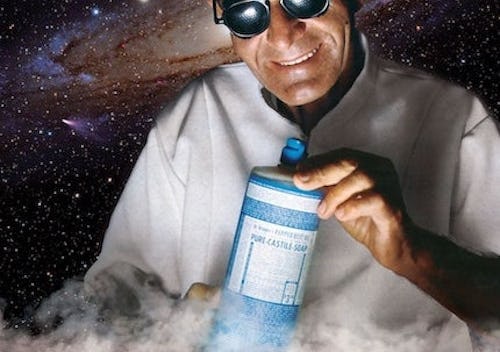Dr. Bronner’s soap wants you to ride the psychedelic train to wellness
It was only a matter of time.

Historically, here in the U.S., drugs have been seen as a scourge to be dealt with by law enforcement, judges, and the prison industrial complex. Never in the puritanical mind have they been seen as misunderstood medicine, capable of treating mental illness that’s nearly as stigmatized as psychedelics themselves. For soap company Dr. Bronner’s, psychedelics are a movement and they’re putting their reputation — and their money — behind it.
Dr. Bronner’s Magic Soaps, the company known for their wordy labels promoting their waste-free production techniques and philosophical credos on faith in mankind and much (much!) more, have become a big financial backer of efforts to loosen government restrictions on currently illegal drugs, specifically psychedelics. The charge, printed on limited edition soap bottles, is led by founder Emanuel Heilbronner’s grandson David Bronner (interesting fact: The founder dropped the “heil” from his family name after the rise of Hitler.)
Since 2015, Dr. Bronner’s has donated more than $23 million to drug advocacy and research organizations, including scientists researching MDMA’s potential in treating PTSD, activist groups trying to decriminalize psilocybin, and others. They’ve also spent millions of dollars on the effort toward cannabis legalization, including toward the effort to eradicate federal prohibition on industrial hemp, which was reversed in 2018.
“Let’s face it, the world would be a far better place if more people experienced psychedelic medicines,” said David Bronner to the New York Times, and although your first instinct might be to not trust someone who drives a rainbow colored Mercedes Benz, he’s kind of right.
Although the original Dr. Bronner — or David for that matter — aren’t actually doctors, the company’s current views on the medical benefits of psychedelics are backed by a decent amount of recent scientific research. Psychedelics have shown potential in treating an array of mental ailments such as OCD, PTSD, anxiety, depression, addiction and more, although their long term effects have yet to be seen. Still, health experts and journalists alike have been watching the research with cautious optimism because they could indeed change the way we treat mental illness in powerful ways.
The zeitgeist may be turning toward reason and away from previous Bush-esque “all drugs are bad” attitudes — even the Food and Drug Administration is considering approving MDMA for the treatment of post traumatic stress disorder. This is in stark contrast to the war on drugs, a “war” which has ended up mostly being a war on Black and brown people. Hopefully, with the help of big companies like Dr. Bronner’s trying to loosen society’s harmful villainizing of some drugs for mental health use, the road to wellness and decriminalization will be better for it, regardless of the race of the person advocating for it.
Dr. Bronner’s actually offers one of these very treatments, ketamine therapy, to their own employees as part of their health coverage. Combine that with the fact that top salaries at Dr. Bronner’s cannot exceed five times the lowest paid fully vested employees with five years on the job and there seems to be some attempts at social equity. This means that both of the company’s current leaders earn around $300,000 a year, compared to the CEOs of other companies who make hundreds of millions. I guess they’re proving that all their “heal the world” talk on their labels isn’t just talk.
Correction 3/1/22: A previous version of this story mentioned an incorrect salary cap for executives at Dr. Bronners. It has since then been corrected.